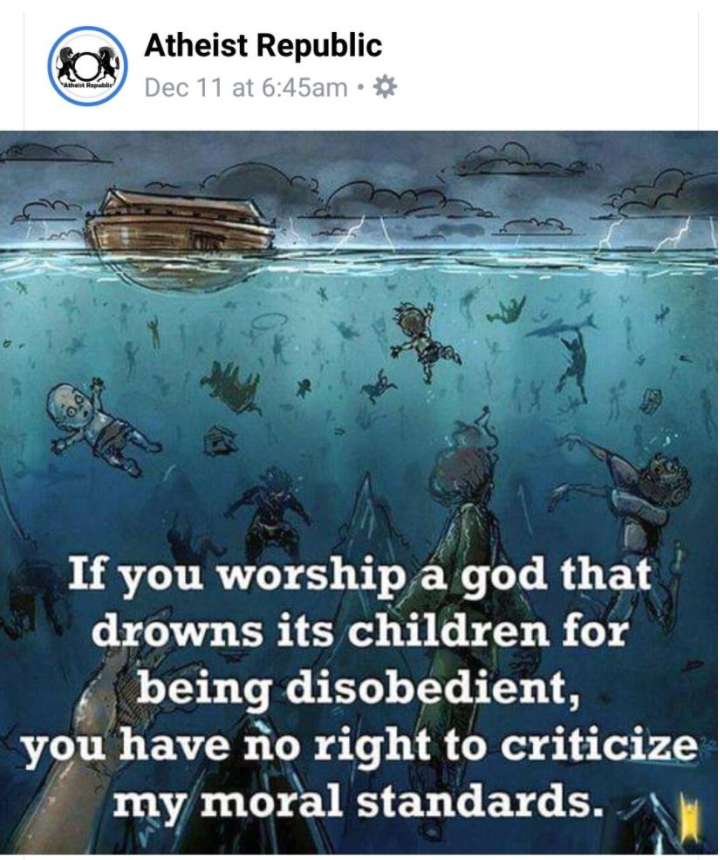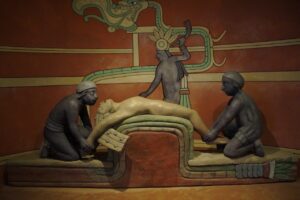This is a guest post written by Phillip Mast. To see more articles by Mr. Mast, go to his blog Theist Thug Life by clicking here.
As what tends to happen, another objection has been making its way around the internet by skeptics and unbelievers. The meme (as seen below) is making two primary assertions in its attack on Christians and our Lord (If you couldn’t tell the picture is depicting Noah’s Ark purposely seemingly with just children drowning). The attack on Christianity is based on an emotional appeal and some moral assumptions that aren’t proven. But before going any further I’d suggest you take a look at the story of the flood and Noah’s Ark in Genesis 6:5 through 8:22 so as to get the context of both the meme and what I am sharing with you.
As mentioned the meme is making an emotional appeal and moral assumptions that aren’t proven or consistent. So let’s break down what is most likely being advocated in the meme and then we will present a better way of looking at the situation given the belief of Christians.
“If you worship a god that drowns its children for being disobedient,”
This is obviously meant to be geared towards the flood event in Genesis and when combined with the imagine depicting children drowning is certainly making an emotional appeal. This is a fallacious argument as the appeal to emotion is in a general category of many fallacies that intend to use emotion in place of reason in order to attempt to win the argument. It is a type of manipulation used in place of valid logic. Now perhaps if the backdrop of drowning children weren’t used one could perhaps advise that it may be making an emotional appeal by use of ‘children’ in the sentence to portray a certain image in the mind. Christians can and do use the phrase of being ‘children of God’ which could be the reference and if it were the case would give the best assumption to the skeptic in this regards.
When it comes to the issue of the flood there was a particular situation beyond simple ‘disobedience’ as the skeptic has put it. Scripture gives insight of what was really the situation. Genesis 6:5 say,
“The Lord saw that the wickedness of man was great in the earth, and that every intention of the thoughts of his heart was only evil continually.”
The wickedness of man was great and that every intent of their hearts was evil continually. This definitely was not a situation of simple disobedience. God is patient and merciful but scripturally there are times in which the amount or kind of wickedness gets to such a level that God acts to pass judgment. We see this also when God passes judgment on Sodomo and Gomorrah in Genesis 18-19 and as well the Canaanite nations in the book of Joshua. Just as in these situations and during the time before the flood God patiently waited. He did not instantly pass judgment when the various peoples started committing wickedness and having evil intents. For instance God even patiently waited over 400 years while his people languished in Egyptian slavery until the canaanite’s iniquity was ‘complete’ (Genesis 15:16) or to such an extent that God could not hold off judgment any longer. Take this longsuffering and patience of God into account when he told Noah to build the Ark. The Ark was a massive piece of construction in Noah’s time. From the accounts of when we are introduced to Noah he is 500 years old and when the floodwaters arrived Noah is 600 years old. We don’t know for certain how long it took Noah to build the Ark but we do know God didn’t give Noah a small building project. It was noticeable and took time to build. Undoubtedly there was bound to be questions asked of Noah as to why he was building a huge ship when it had not rained previously. So we have two pieces of information to consider about God’s passing judgment: He was patient still and despite even this little added time people did not repent from their wickedness, violence, and evil intent. So what we have done here is show that God isn’t some being that just arbitrarily destroys people for no reason but is instead patient and in fact desires that wicked people repent as we see elsewhere like Ezekiel 18:23; 33:11.
“you have no right to criticize my moral standards.”
Further there has been this assumption that God cannot take the life of anyone. In fact the argument most associated with the flood incident, the Canaan judgment, or Sodom and Gomorrah is that the skeptic says that God murders these people. Why is that? Skeptics assume that God is not allowed or has no reason to take their life and so his doing so one way or another is murder. They then argue that since God is a murderer he can’t be moral and therefore should not be followed. This is why the meme’s second part is written. They essentially are saying, “Since your God is a immoral murdering God, you have no right to criticize my moral” However this approach to these things is in error and we will show why.
Killing and Murder
To those who say God murders I pose the following thoughts: Is it immoral for a child to drown Or just to be drowned? If we say it is immoral to be drowned, then it is the act of a moral agent that we are objecting to and this means that we are putting the issue of killing someone into the category of moral wrong rather than someone simply dying. This is to say there is a categorical difference between a moral wrong and a tragedy. Therefore if we are talking about a moral agent killing another we must ask if a moral agent can possess authority or moral justification for allowing, or acting out the killing of another. Let’s put this in a form of a syllogism:
1. Killing is not murder or even a crime when justified or when the taker of a life has the authority to do so.
2. Authority or justification can be possessed by a moral agent
3. Not all killing is murder
4. Therefore, you can kill someone and not be morally wrong.
The point here is this: A moral agent can possess the authority to take the life of another. So does God possess this authority? Is he justified in his taking of human life? Let’s looks at some specifics for both man and God as Christians view the situation that supports God possessing the justification and authority, to take any human life resulting in that God did nothing morally wrong.
About Man
A seeming assumption in the meme is that the people involved are somehow innocent. Scripture clearly demonstrates this is not the case. In the specific instances often cited, like in the flood or Canaan judgment, scripture mentions that the people were wicked, violent, or evil. The Canaanites are somehow painted as if they are these peaceful loving people groups dwelling in Canaan that God just somehow chose to destroy. But is this the case? No. Apologetics Press sufficiently explains why God moved to pass judgment on the nations of Canaan,
“The Canaanite nations were punished because of their extreme wickedness. God did not cast out the Canaanites for being a particular race or ethnic group. God did not send the Israelites into the land of Canaan to destroy a number of righteous nations. On the contrary, the Canaanite nations were horribly depraved. They practiced “abominable customs” (Leviticus 18:30) and did “detestable things” (Deuteronomy 18:9, NASB). They practiced idolatry, witchcraft, soothsaying, and sorcery. They attempted to cast spells upon people and call up the dead (Deuteronomy 18:10-11).
Their “cultic practice was barbarous and thoroughly licentious” (Unger, 1954, p. 175). Their “deities…had no moral character whatever,” which “must have brought out the worst traits in their devotees and entailed many of the most demoralizing practices of the time,” including sensuous nudity, orgiastic nature-worship, snake worship, and even child sacrifice (Unger, p. 175; cf. Albright, 1940, p. 214). As Moses wrote, the inhabitants of Canaan would “burn even their sons and daughters in the fire to their gods” (Deuteronomy 12:30). The Canaanite nations were anything but “innocent.” In truth, “[t]hese Canaanite cults were utterly immoral, decadent, and corrupt, dangerously contaminating and thoroughly justifying the divine command to destroy their devotees” (Unger, 1988). They were so nefarious that God said they defiled the land and the land could stomach them no longer—“the land vomited out its inhabitants” (Leviticus 18:25).
When it comes to the flood incident we are given some further information about the current condition of mankind aside from Genesis 6:5. Genesis 6:11-12 also states that, “Now the earth was corrupt in God’s sight, and the earth was filled with violence. And God saw the earth, and behold, it was corrupt, for all flesh had corrupted their way on the earth.” This ‘corruption’ is sin and not only were all people then in sin but even today we are all in a state of sin. Romans 3:23 states“for all have sinned and fall short of the glory of God,” to be honest I think most anyone would at least not argue with the fact mankind is far from perfect. This imperfection cast us as falling short of God’s glory or perfection. This is sin and it stains us, leaving us in a fallen condition that merits nothing other than death and separation from this perfect God (Romans 6:23).
About God
God is described as the maximally great being. God by definition possesses properties that make him maximally great. To be perfect, rather than imperfect, is certainly a great making property and so God is therefore perfect in every way, which includes being the good itself. 1 Timothy 6:16 further describes God as “who alone has immortality, who dwells in unapproachable light”. This would be one of many ways the scriptures talk about God uniqueness and holiness. Sadly, our understanding of God’s holiness even for the church in our current culture is severely lacking and even more so with skeptics who want to question God’s character. This lack of understanding is then combined with a misunderstanding of man’s condition before such a perfect being.
God as the maximally great being who is author, sustainer, and creator of life is the sole authority in these matters. Mankind is dead in sin and unable to approach a Holy God. Since God is the good God WONT murder. God didn’t murder when he wiped out life on earth in the flood because he possesses the authority to take it, and he has the justification for doing so. God is under no obligation to sustain the life of anyone who merits death due to sin.
Thus we can wrap up all this in 3 simple points:
1. There is a difference between murder and justified killing and that lies in authority.
2. God has ultimate authority over all life and death.
3. Therefore, God has the authority to kill anyone at any time.
To all this one might question why we must care about God’s alleged authority. One may answer that you don’t necessarily have to care! God created human beings with limited libertarian freedom that allowed us to sin. Adam and Eve had a choice, as do we, as to our actions. Do we obey God and his commands that seek our good? Or do we exercise that freedom? Just remember that the freedom to sin is the definition of rebellion and of which we are all guilty of and as stated that rebellion has a cost.
Good News
Often overlooked in these objections by skeptics and unbelievers is what God has done for them. God doesn’t merely stand by waiting for the perfect time to pass judgment on us all, though we certainly deserve it. Scripture instead demonstrates a God who is patient and merciful. As Ephesians 2:1-10 states,
“And you were dead in the trespasses and sins 2 in which you once walked, following the course of this world, following the prince of the power of the air, the spirit that is now at work in the sons of disobedience— 3 among whom we all once lived in the passions of our flesh, carrying out the desires of the body[a] and the mind, and were by nature children of wrath, like the rest of mankind.[b] 4 But[c] God, being rich in mercy, because of the great love with which he loved us, 5 even when we were dead in our trespasses, made us alive together with Christ—by grace you have been saved— 6 and raised us up with him and seated us with him in the heavenly places in Christ Jesus, 7 so that in the coming ages he might show the immeasurable riches of his grace in kindness toward us in Christ Jesus. 8 For by grace you have been saved through faith. And this is not your own doing; it is the gift of God, 9 not a result of works, so that no one may boast. 10 For we are his workmanship, created in Christ Jesus for good works, which God prepared beforehand, that we should walk in them.”
God is a God of not only Justice and wrath against sin but of Love and mercy. We all deserve God’s just wrath but he offers freely his love and mercy. He did this on the cross when he sent his son Jesus to take our place. The debt we owed he paid if we but repent and believe. There is nothing we can do to earn this saving grace and therefore no one can boast. Many skeptics appear to be repelled by this in their pride. Yet they are alive, by the grace of God who continually sustains their very life this instant. More grace and patience. Don’t shirk the time you have now to consider these things. I implore you to recognize that we all come from a stained existence that God is just to pass judgment on but his longsuffering and patience provides a way out. He freely gives what we don’t deserve instead of what we do deserve. It is best that the attention of the skeptic be turned away from God justly punishing evil, that they too fall under, and recognize the way of redemption available.
Citation and Further Reading
———————————————————————————————
ABOUT THE AUTHOR
 Phillip Mast is an aspiring Christian apologist with special interest relating to soteriology after becoming a Molinist approximately two years ago. Currently he pursues various personal studies while being active in a local church body in which he leads the ‘Sheepdawg’ ministry. He is a Husband to his beautiful wife Courtney of 11 years, Father of 5, and has an active career in Law Enforcement. He also admins on the Facebook page “Theist Thug Life” which focuses on highlighting evidence for God’s existence, God’s Sovereignty, and Human Freedom.
Phillip Mast is an aspiring Christian apologist with special interest relating to soteriology after becoming a Molinist approximately two years ago. Currently he pursues various personal studies while being active in a local church body in which he leads the ‘Sheepdawg’ ministry. He is a Husband to his beautiful wife Courtney of 11 years, Father of 5, and has an active career in Law Enforcement. He also admins on the Facebook page “Theist Thug Life” which focuses on highlighting evidence for God’s existence, God’s Sovereignty, and Human Freedom.Discover more from Cerebral Faith
Subscribe to get the latest posts sent to your email.




